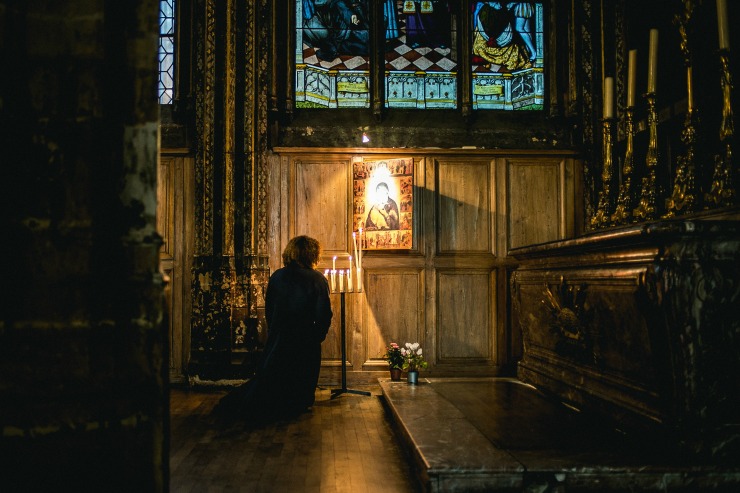“Martha, Martha…” One of the options for the Gospel reading today, on this feast of Sts. Mary, Martha, and Lazarus, contains a oft-misunderstood rebuke of St. Martha.
You know the scene. Jesus and his Apostles have stopped by Bethany to find respite at the home of their friends. We know Jesus loved them very much, and we should aspire to make our hearts as welcoming and restful as these saints made their home. Martha is working hard to make sure Jesus’ visit is a good one. We can imagine her cooking and tidying up and doing everything that needs to be done when thirteen men show up at your house. Mary, meanwhile, is sitting with Jesus. All of us can probably relate to Martha’s frustration with her sister.
Much has been written and taught about this famous scene. The sisters have long been seen as metaphors for the active and contemplative life. But there is a danger in misreading what is behind Jesus’ admonition of Martha.
Yes, Mary sitting at the feet of Jesus is a beautiful metaphor for the contemplative life. But Blessed Alvaro del Portillo pointed out, “But the contemplative life does not consist in simply being at the feet of Jesus doing nothing. That would be a disorder, if not pure and simple indolence.”
Ask any contemplative sister or monk if they spend their life doing nothing. That is, if you can manage to catch them between their work in the fields, sewing vestments, or making soap, hosts for Mass, and Chartreuse…
Prayer and Work
Their lives are rather, in the words of St. Benedict, about prayer and work. They find Jesus in their daily activities. Contemplatives do, of course, spend a lot more time in front of Jesus in the Blessed Sacrament than any of the rest of us do! And prayer is work – the power of their prayers is what is keeping the world in rotation at this very moment. But there are also plenty of times of intense physical and mental work outside the chapel.
And yet even in the midst of all their work – and this is the key – their minds are on God. The great Carthusian prior, Guigo, codified the steps of lectio divina, the monastic way of praying with Scripture. But when did he think of the steps? Where was he caught up in prayer so that the image of the levels came to him? Not in the chapel. Rather, he tells us:
“One day when I was busy working with my hands I began to think about our spiritual work, and all at once four stages in spiritual exercise came into my mind: reading, meditation, prayer, and contemplation.”
When he was “busy working with his hands,” his mind was on spiritual things. Obviously, certain types of work lend themselves to this type of thought. When we are sitting at our desk analyzing data or standing in front of a classroom teaching, we must have minds focused on the task at hand. But what about when we stand up from our desk to take a break? Do I finger that rosary in my pocket and whisper a quick hello to our Mother Mary? Maybe glance at the crucifix on the wall between class periods and ask for help as the next round of kids come in the door? Do I begin my day with the morning offering, asking God to make everything I do that day a prayer?
Father Fernandez writes, “For too long a time there has been a mistaken insistence on the supposed incompatibly between secular work and the interior life. Nevertheless, it is there in the midst of daily work and by means of it, not in spite of it, that God wants to call most Christians to lives of holiness.”
Attitude and Focus
We need to be careful not to misunderstand our Lord’s rebuke of Martha. After all, as a good friend pointed out to me – Jesus didn’t say “Martha, Martha, you’re too busy.” He said, “Martha, Martha, you’re too anxious.”
We should be hesitant to throw Martha under the bus. In fact, who is the one who runs out to meet Jesus when he comes after Lazarus’ death? Martha. This story is the other option for the Gospel today. It’s hard to tell what exactly is the mentality of the two sisters at this time, but John tells us: “When Martha heard that Jesus was coming, she went to meet him; but Mary sat at home” (John 11:20). Both women greet him individually with the same thing: If he had come earlier, Lazarus wouldn’t have died. But Martha qualifies that statement immediately with this great act of faith: “But even now I know that whatever you ask of God, God will give you“ (John 11:22).
So let’s not be too hasty to set up Martha as the bad sister, nor to judge her service as the problem. After all, later in Jesus’ public ministry we see him again at dinner with them, and Martha is serving without reprimand (John 12).
It is her attitude and focus, not her service that receives the admonishment. Jesus instructs us to see Him in the poor we serve. Here Martha has the opportunity to serve Jesus Himself, in the flesh. Rather than be anxious and distracted, she should be making that service a prayer to Him. Martha was anxious because her work had become her sole focus, rather than allowing her work to lead her to Him.
The Challenge
This is the opportunity each one of us has as we go throughout our days. We do not get to make Jesus dinner. But we do, perhaps, have the opportunity to make dinner for our family. And do we offer that up and make it a prayer to Christ? We all have daily responsibilities as part of our vocations that we must fulfill. It is in “the midst of daily work and by means of it, not in spite of it” that we are called to be saints.
How can I make my work a prayer – even the work that seems to have nothing to do with the Gospel? Whether I’m an accountant, a lawyer, an Uber driver, a teacher, a stay-at-home dad, or a contemplative nun – how do I make the balance sheets, the traffic, the staff meetings, or the laundry a prayer? Does my mind return to our Lord throughout the day? Do I thank him for the joys – even the little ones? In my work, do I strive to act with justice and charity and see Christ in those I serve?
Let us not allow our daily work to make us anxious or distracted from what really matters. It is not that we neglect our daily work or do it absent-mindedly because we’re focused on Christ. Rather, it is about making our daily work a prayer–even that work that seems to have nothing to do with the Gospel. Let us make all our work a prayer, putting our anxieties, stress, and annoyances with others into His hands–allowing them to sanctify us and those we serve.














